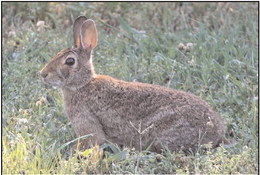AGFC on the lookout for new rabbit virus

Hemorrhagic Disease sweeping through Arkansas, warn wildlife officials
AGFC Communications LITTLE ROCK — A new disease is sweeping through rabbit populations in the United States, and it has officials at both the Arkansas Game and Fish Commission and the Arkansas Department of Agriculture concerned.
Rabbit Hemorrhagic Disease Virus (RHDV) is a highly contagious virus that is nearly always fatal and is capable of causing high mortality in both domestically raised rabbits and wild rabbit species found in Arkansas.
The virus has been recognized since the 1980s as a disease of domestic rabbits, but a new strain (RHDV-2) emerged in 2010, which also affects wild rabbit and hare species native to North America. Arkansas’s two native rabbit species, the eastern cottontail and swamp rabbit, both can see large die-offs if the virus reaches The Natural State.
“There are protocols and transport restrictions that can prevent the spread of diseases in domestic populations, but once a disease is found in wild populations, it may become established with little hope of eradication,” said Dr. Jenn Ballard, state wildlife veterinarian for the AGFC.
“We haven’t found this disease in Arkansas, yet, and we want to do everything we can to keep it from being introduced to our state.”
An outbreak of RHDV-2 was documented beginning in March 2020 in the southwestern U.S. and has spread quickly through domestic and wild rabbits.
To date, cases have been detected in Arizona, California, Colorado, Nevada, New Mexico, and Texas as well as being reported in Mexico.
Ballard stresses that RHDV-2 is not the same thing as tularemia, also known as “rabbit fever,” a well-known bacterial disease that can be passed to humans.
“Neither virus strain of RHDV is known to infect humans, other pets or livestock outside of the rabbit and hare family,” Ballard said. “But this virus has the potential to be very destructive in rabbit populations where it occurs, so we must stay vigilant.”
With recent increased interest in breeding domestic rabbits as a food source and homesteading in Arkansas, there also is concern among rabbit owners that newcomers to the trade may not know to abide by certain rules in purchasing and importing domestic rabbits.
Importing domestic rabbits into Arkansas, except when moving directly to a USDA-licensed slaughter facility, requires a Certificate of Veterinary Inspection. This includes the movement of all pet, show, and production rabbits not intended for immediate slaughter. Importing wild rabbits into Arkansas also requires a CVI along with an importation permit issued by the AGFC.
Ballard stresses that any person who finds a concentration of dead rabbits while in the outdoors should contact the AGFC’s wildlife health program immediately with coordinates of the location.
Details may be emailed to agfc.health@agfc.ar.gov.
“We’ve also worked with the Arkansas Department of Agriculture Livestock and Poultry Division to develop a brochure of ways domestic rabbit owners and wildlife enthusiasts can help prevent the spread of RHDV-2,” Ballard said. “It is available on our website, agfc.com.”




Share